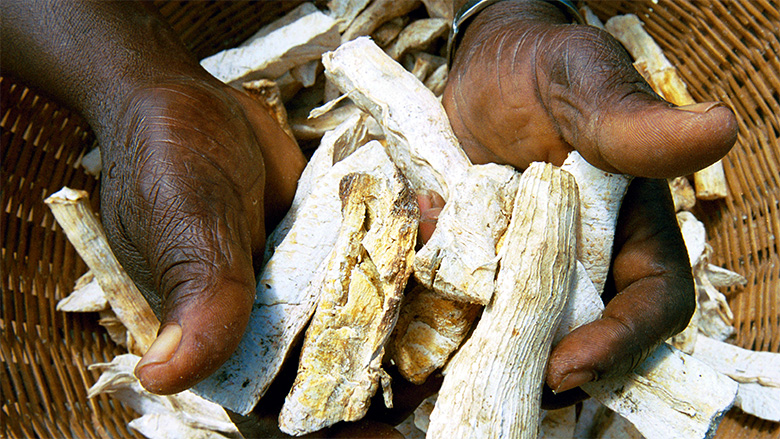The purpose of the evaluation is to assess how relevant and effective the World Bank Group has been in its support for agrifood system development (AFSD) —that is, in developing more productive, inclusive, and sustainable farms and agribusiness firms. The evaluation finds that the Bank Group’s interventions (FY 2010–20) were broadly relevant, although gaps remain in scaling up and better targeting support to countries that need it the most. Bank Group interventions were also effective overall in improving productivity, inclusion, and sustainability, but less so in LICs, particularly in West and Central Africa. World Bank interventions that focused on supporting production were less successful than interventions that combined production and market approaches. World Bank support for improving productivity was insufficiently diversified toward higher-value products that offer multiple benefits. IFC agribusiness investments faced challenges meeting environmental and social (E&S) standards, especially in LICs. IEG offers three recommendations to enhance Bank Group support for AFSD. (i) To enhance its effectiveness in developing agrifood systems, the World Bank Group’s efforts to support production technologies should be complemented by efforts to improve market access, especially in LICs and in countries at the traditional stage of agrifood system development. These can be pursued through synergies in Bank Group interventions or with partners; (ii) To achieve more sustainable agrifood systems, where conditions permit, the World Bank Group should support production diversification to meet the growing demand for undersupplied high-value-added, nutritious products while ensuring that smallholder farmers and SMEs benefit from the diversification; and (iii) To enhance the contribution of IFC support for AFSD, IFC should pilot and adopt more effective ways to support clients to better meet E&S Performance Standards, especially in LICs.
Tag Archives: Agribusiness
eC2: Assessment of PS6 risks in several supply chains in agribusiness and forestry sector in Colombia
Deadline: 30-Nov-2020 at 11:59:59 PM (Eastern Time – Washington D.C.) 
The assignment is focused on Orinoquia region with specific focus on Puerto Carreno, La Primavera and Santa Rosalia in Vichada area. The assignment has three objectives:
eC2: PS 6 Supply chain in Agribusiness Sector
Deadline: 03-Nov-2020 at 11:59:59 PM (Eastern Time – Washington D.C.)
1. To assist the ESG Department with their due diligence, supervision and/or advisory services support related to biodiversity risks associated with supply chains on agribusiness Investment projects in line with IFC Performance Standard 6 (PS6), as needed.
2. To share resources and networks that may enable IFCs clients to more effectively implement PS6 requirements related to supply chains.
eC2: End-of-Term Review of IFC Agribusiness Program Indonesia
Deadline: 13-Feb-2020 at 11:59:59 PM (Eastern Time – Washington D.C.) 
The IFC Indonesia Agribusiness Program (the program) aims to promote inclusive and sustainable rural growth in Indonesia. It does this through the following three objectives: (i) Increase the income of smallholder farmers from sustainable agricultural production; (ii) Increase gender-responsive investments in agriculture and rural communities; and (iii) Increase demand for sustainably produced agricultural commodities.
eC2: IMPROVING FOOD SAFETY MANAGEMENT SYSTEMS AT RICE MILLS MANUFACTURING, AGRIBUSINESS AND SERVICES (MAS) ADVISORY
Deadline: 21-Oct-2019 at 11:59:59 PM (Eastern Time – Washington D.C.) 
Interested consulting firms (or consortium of firms) are expected to have:
Deeply understanding HACCP, GMP, GHPand international food safety management standards such as ISO22000, BRC, other relevant standards and relevant government regulations. Team Leader should have experience working in international food safety management standards (particularly for BRC Global Standards), food science, food technology/engineering, and food industry. At least one of team member is BRCs certified trainer and other one has excellent spoken and written proficiency in both English and Khmer languages. Proven experience on conducting food safety gap assessments/audits
Previous working experience with the World Bank Group is a benefit.
eC2: Support to the identification and implementation of priority reforms in the agribusiness sector in Guinea
Deadline: 24-Jun-2019 at 11:59:59 PM (Eastern Time – Washington D.C.)
The Investment Climate (IC) in Agribusiness project is a pillar of the IFC-World Bank  Action Plan to promote the agribusiness sector in Guinea. The World Bank Group recently assessed the main constraints and opportunities for the development of the agribusiness sector in Guinea.
Action Plan to promote the agribusiness sector in Guinea. The World Bank Group recently assessed the main constraints and opportunities for the development of the agribusiness sector in Guinea.
The IC in Agribusiness project aims to improve the business climate for agribusiness through the implementation of targeted reforms aimed at unlocking investments high potential value chains and improving investments retention and generation. To implement these reforms, a dialogue mechanism to mobilize government and business community’s commitment is needed.
The IFC seeks to hire the services of a Consultant to support the identification and implementation of priority reforms for the agribusiness sector in Guinea. The Consultant will help drive the reforms on the Guinea agribusiness sector and will work closely with the designated teams within to implement these reforms.
eC2: Brand Design and Marketing Strategy for Export Promotion – Laikipia Integrated Feedlot Scheme (LIFS)
Deadline: 24-Jun-2019 at 11:59:59 PM (Eastern Time – Washington D.C.)
The proposed Laikipia Integrated Feedlot Scheme (LIFS)initiative seeks to improve the  quantity and quality of livestock commodities produced in the county by the key value chain actors. More specifically, the LIFS project focuses on improved productivity across the red meat value chain from livestock production to slaughter, processing and access to markets.
quantity and quality of livestock commodities produced in the county by the key value chain actors. More specifically, the LIFS project focuses on improved productivity across the red meat value chain from livestock production to slaughter, processing and access to markets.
The existing value chain in the county is however fragmented and characterized by limited coordination between the value chain activities and players, and disease control thus unable to compete directly in the international market with producers like Australia. For the Scheme to be bankable, preliminary findings inform of the need to focus on a differentiated product and targeting of high-value local and international markets. This assignment, therefore, seeks to engage an experienced consultant firm to develop a brand design and marketing strategy for export promotion of the products that will be produced in the LIFS value chain.
eC2: Support on expansion of alternative fuels production and waste management capacity for a major refuse-derived fuel supplier in Egypt
Deadline: 08-Apr-2019 at 11:59:59 PM (Eastern Time – Washington D.C.) 
IFC’s Manufacturing, Agribusiness and Services team is seeking a consultant to provide support on an assignment for a major producer of alternative fuels for the cement sector (including RDF), or the Client. The Client is planning to expand operations in two governorates. The consultant is expected to support the preparation phase of this project. This gap assessment will help confirm the viability of the client’s business model, strength of the local supply chain and overall waste management operations, as well as the capacity of the Client itself to play the bigger role in integrated waste management operations.
eC2: Support Agribusiness Competitiveness in Azerbaijan
Deadline: 11-Mar-2019 at 11:59:59 PM (Eastern Time – Washington D.C.)
The Project aims at enhancing the market competitiveness of the agribusiness sector as a first priority in diversifying the country’s economy by: (i) enhancing access to quality seeds, and (ii) regulatory streamlining along agribusiness value chains. The regulatory work in the horticulture value chain will seek to reduce the administrative burden of private sector players in these markets and thus contribute to cutting private costs and improve the competitiveness of the horticulture industry.
eC2: Improving policies and regulations for water efficiency in South African agribusiness clusters
Deadline: 28-Feb-2019 at 11:59:59 PM (Eastern Time – Washington D.C.) 
The objective of this consultancy is to identify and ensure buy-in to policy, regulatory or procedural interventions by public institutions to support the uptake of water efficiency initiatives by businesses in the projects target agri-processing clusters. The scope of work would include:

You must be logged in to post a comment.